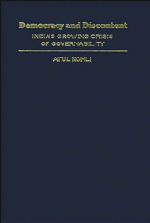Book contents
- Frontmatter
- Contents
- List of tables and figures
- Preface and acknowledgments
- PART I INTRODUCTION
- PART II THE GROWING PROBLEMS OF GOVERNING THE PERIPHERY: POLITICS IN THE DISTRICTS
- PART III ORDER AND BREAKDOWN IN THE STATES
- PART IV CENTRALIZATION AND POWERLESSNESS AT THE CENTER
- Introduction: the Center
- 11 Managing the economy: halfhearted liberalization
- 12 Managing the troubled political institutions: the Congress party and relations with Punjab
- Conclusion: the Center
- PART V FINAL INFERENCES
- Bibliography
- Index
Conclusion: the Center
Published online by Cambridge University Press: 05 June 2012
- Frontmatter
- Contents
- List of tables and figures
- Preface and acknowledgments
- PART I INTRODUCTION
- PART II THE GROWING PROBLEMS OF GOVERNING THE PERIPHERY: POLITICS IN THE DISTRICTS
- PART III ORDER AND BREAKDOWN IN THE STATES
- PART IV CENTRALIZATION AND POWERLESSNESS AT THE CENTER
- Introduction: the Center
- 11 Managing the economy: halfhearted liberalization
- 12 Managing the troubled political institutions: the Congress party and relations with Punjab
- Conclusion: the Center
- PART V FINAL INFERENCES
- Bibliography
- Index
Summary
The attempts of the Indian government to implement certain important policies have been analyzed in this part of the study, and this analysis can be used to develop a concluding statement on the ability of the national state apparatus to solve pressing problems. The record reported here, though not impressive, involved selected topics and incomplete data. Before generalizing from such limited data, therefore, several important qualifications are in order.
First, the problem of “collective action” in democracies is widely recognized. One can, therefore, anticipate some of the difficulties in India of pursuing policies that bring forth competing and divergent responses. Although that is not an alibi for ineffectiveness, it should raise one's tolerance for what can and cannot be expected from elected governments.
Second, there are many policy areas in which the Indian government continues to function effectively. For example, most observers are likely to judge India's management of foreign policy, the military, or even the many daily decisions on the economy as reasonably satisfactory. What distinguishes the competence in those areas from the policy failures examined here is the scale of the decisions involved, and hence the issue of who is in charge of problem-solving. Once the basic framework of a policy is set, India's bureaucracy is quite competent at piecemeal implementation. The issues analyzed earlier, by contrast, involve important decisions and major political initiatives.
- Type
- Chapter
- Information
- Democracy and DiscontentIndia's Growing Crisis of Governability, pp. 378 - 380Publisher: Cambridge University PressPrint publication year: 1991



